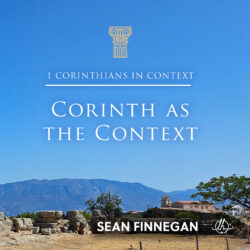This is part 18 of the Read the Bible For Yourself.
What tools can help you understand the bible better? Today we’ll cover some recommended resources for you to deepen your study of the scriptures, including bible dictionaries, commentaries, bible software, AI, and more. Of course, it’s impossible to cover everything in a reasonable time frame, so I’ll just recommend two or three of each resource type, focusing primarily on tools that I personally have and use regularly.
Listen to this episode on Spotify or Apple Podcasts
—— Links ——
- See other episodes in Read the Bible For Yourself
- Other classes are available here, including How We Got the Bible, which explores the manuscript transmission and translation of the Bible
- Get the transcript of this episode
- Support Restitutio by donating here
- Join our Restitutio Facebook Group and follow Sean Finnegan on Twitter @RestitutioSF
- Leave a voice message via SpeakPipe with questions or comments and we may play them out on the air
- Intro music: Good Vibes by MBB Attribution-ShareAlike 3.0 Unported (CC BY-SA 3.0) Free Download / Stream: Music promoted by Audio Library.
- Who is Sean Finnegan? Read his bio here
—— Notes ——
18 Helpful Tools to Understand the Bible
Why do we need extra-biblical tools to help us understand the Bible?
- Different geography
- Different history
- Different cultures (ancient Near Eastern, first-century Jewish, Greco-Roman)
- Different economics
- Different literacy rates
- Different scientific and philosophical knowledge
Bible Dictionaries
- International Standard Bible Encyclopedia (1915)
- Eerdmans Dictionary of the Bible (2000)
- Holman Illustrated Bible Dictionary (2015)
- The IVP Bible Dictionary Series
- Dictionary of OT: Pentateuch (2002)
- Dictionary of OT: Historical Books (2005)
- Dictionary of OT: Wisdom, Poetry, & Writings (2008)
- Dictionary of OT: Prophets (2012)
- Dictionary of NT Background (2000)
- Dictionary of Jesus & Gospels (2013)
- Dictionary of Paul & Letters (2023)
- Dictionary of the Later NT (1997)
Commentaries
- Fee & Stuart: “Jesus says, ‘…It is easier for a camel to go through the eye of a needle than for someone who is rich to enter the kingdom of God.’ You will sometimes hear it said that there was a gate in Jerusalem known as the “Needle’s Eye,” which camels could go through only by kneeling, and with great difficulty. The point of this “interpretation” is that a camel could in fact go through the “Needle’s Eye.” The trouble with this “exegesis,” however, is that it is simply not true. There never was such a gate in Jerusalem at any time in its history. The earliest known “evidence” for this idea is found in the eleventh century(!) in a commentary by a Greek churchman named Theophylact, who had the same difficulty with the text that many later readers do. After all, it is impossible for a camel to go through the eye of a needle, and that was precisely Jesus’ point. It is impossible for someone who is rich to enter the kingdom. It takes a miracle for a rich person to get saved…”[1]
- Zondervan Illustrated Bible Background Commentary (ZIBBC – 10 vols.)
- New International Commentary (NICOT – 30 vols.; NICNT – 20 vols.)
- New International Greek Testament Commentary (NIGTC – 12 vols.)
- The New Testament for Everyone by N. T. Wright (18 vols.)
Bible Project Videos
- Book Overviews (OT – 39 videos; NT – 26 videos)
- How to Read the Bible (19 videos)
- Themes (41 videos)
- Word Studies (21 videos)
- Many more at com/explore/
Software
- Lots of translations
- Original language resources
- Cross-references
- Outlines
- Search tools
- Accordance & Logos
Search Tools
- Artificial intelligence chat bots (openai.com)
- Crowd sourced websites (info/topics)
Review
- Bible dictionaries and encyclopedias provide short articles on places, individuals, and topics in the Bible.
- Older and free research tools sometimes contain inaccuracies that more recent scholarship has overturned or updated.
- A good commentary tells you the options for interpreting a verse, reasons for each of those options, and a suggestion for which one makes the most sense.
- The Bible Project’s book overview videos are really helpful to get a general understanding of a book of the Bible.
- Bible software on PCs, tablets, and phones provide worldclass research tools to help you study scripture.
- When searching for a phrase, a topic, or something specific, you can use a Bible app, openbible.info, or AI.
[1] Gordon D. Fee and Douglas Stuart, How to Read the Bible for All Its Worth (Grand Rapids, MI: Zondervan, 2014). p. 29.







Sean, I’m so glad you spoke about the biblical languages. Of course, many people don’t have the time, patience, or aptitude to grasp Hebrew or Greek (I’ve been working on learning biblical Hebrew now for a few years, quite steadily, and I’m barely beginning). Thank you also for mentioning Daily Dose of Hebrew (I listen to it religiously every day) and Aleph with Beth. I think I have spent hundreds of hours on that site. My objective is one hour a day. What’s great about Beth and Andrew (Americans, living in Mexico, teaching biblical Hebrew!) is that the first 100 or so videos covers something like 95% of all the words in the OT that are used 500 or more times (all the main words). I may have these stats wrong, but it’s something like that. They do fun, goofy things, act out skits, do classroom sessions with teens (which is really great!), and use puppets and toys to teach with. I am a super slow learner, but I often am amazed that I can watch and read the Hebrew presented and understand it all. That makes me feel I’m learning Hebrew! It’s a super fun and funny language (not as nuts as Swedish though!), and, well, Greek? That’s just Greek to me. Not touching that. Thanks again, Sean. I also would recommend Tim McNinch’s videos, especially the alphabet (he teaches you a good song to memorize that) and all his verb conjugation ones.